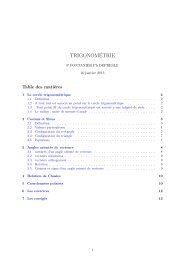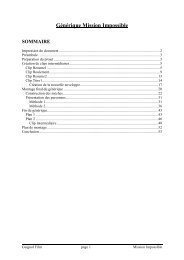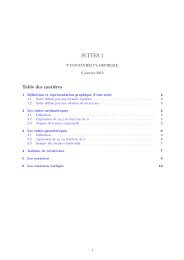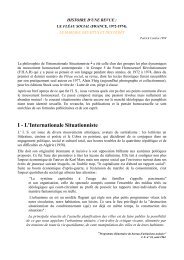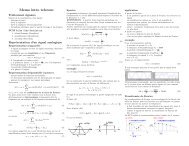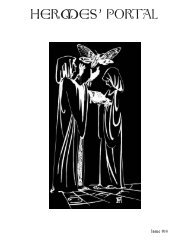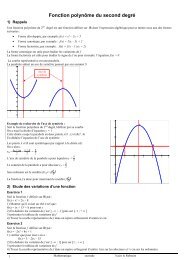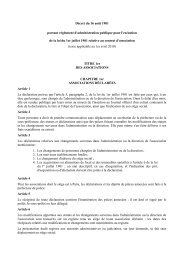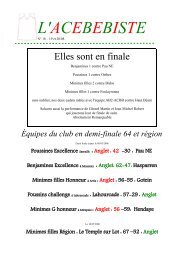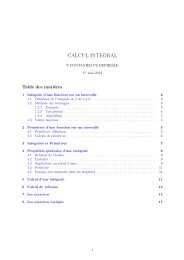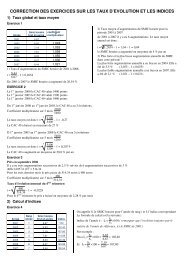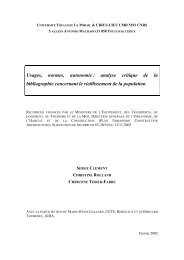internationalisation in science in the prism of bibliometric indicators
internationalisation in science in the prism of bibliometric indicators
internationalisation in science in the prism of bibliometric indicators
You also want an ePaper? Increase the reach of your titles
YUMPU automatically turns print PDFs into web optimized ePapers that Google loves.
eviewed journals draw <strong>the</strong>ir legitimacy, as an <strong>in</strong>termediation, from<br />
organisation <strong>of</strong> certification and archival. For <strong>the</strong> first time perhaps,<br />
anticipation on <strong>the</strong> mid-term future <strong>of</strong> <strong>the</strong> system becomes difficult,<br />
s<strong>in</strong>ce alternative models can emerge both for certification and<br />
archives, on pr<strong>in</strong>ciples <strong>of</strong> self-organised and decentralised <strong>science</strong><br />
(G<strong>in</strong>sparg, 2000, Harnad, 2001). An undisputable progress <strong>in</strong><br />
<strong><strong>in</strong>ternationalisation</strong> <strong>of</strong> communication, besides <strong>the</strong> web post<strong>in</strong>g <strong>of</strong> many<br />
types <strong>of</strong> scientific documents and teach<strong>in</strong>g material, is <strong>the</strong> onl<strong>in</strong>e<br />
availability <strong>of</strong> journal articles through electronic portals, which can<br />
be a bonanza for countries or prov<strong>in</strong>ces deprived from easy access to<br />
literature (see <strong>in</strong> particular <strong>the</strong> RFBR 8 <strong>in</strong>itiative <strong>in</strong> Russia). The role<br />
<strong>of</strong> Internet for access <strong>of</strong> peripheral countries to <strong>in</strong>formation and<br />
knowledge is a planetary level stake. 9 Free or easy access to many<br />
sources contributes to open competition, with obvious limits for tacit<br />
knowledge exchanges.<br />
4 - INTERDEPENDENCE NETWORKS<br />
We will ma<strong>in</strong>ly focus on co-authorship networks. They only represent<br />
an <strong>in</strong>stance <strong>of</strong> <strong>in</strong>ternational co-operation (see above), but sort <strong>of</strong><br />
"certify" a particularly <strong>in</strong>tense form <strong>of</strong> collaboration.<br />
1. Co-authorship networks<br />
Due to <strong>the</strong>ir richness <strong>of</strong> <strong>in</strong>terpretation and <strong>the</strong>ir documentation at<br />
<strong>the</strong> <strong>in</strong>stitutional level <strong>in</strong> several databases, co-authorship networks<br />
have given birth to a huge amount <strong>of</strong> contributions from <strong>the</strong>oretical,<br />
methodological and political po<strong>in</strong>t <strong>of</strong> view. The reader is referred to<br />
<strong>the</strong> chapter by Glaenzel & Schubert for methodological po<strong>in</strong>ts and a<br />
bibliography. In this section we will focus on some determ<strong>in</strong>ants and<br />
limits <strong>of</strong> <strong>in</strong>ternational collaboration. Basically collaboration is<br />
driven by <strong>the</strong> same eng<strong>in</strong>es as o<strong>the</strong>r <strong><strong>in</strong>ternationalisation</strong> mechanisms, <strong>in</strong><br />
<strong>the</strong> framework <strong>of</strong> strong cultural and national constra<strong>in</strong>ts. The need for<br />
collaboration, <strong>the</strong> first eng<strong>in</strong>e <strong>of</strong> <strong><strong>in</strong>ternationalisation</strong>, is <strong>in</strong>herent to<br />
scientific community, anchored <strong>in</strong> <strong>the</strong> complementarity <strong>of</strong> competencies.<br />
Collaboration is generally seen as a natural response to specialisation<br />
and <strong>in</strong>creas<strong>in</strong>g competition pressure, and br<strong>in</strong>gs better citation returns<br />
(Herbertz, 1995), even contribut<strong>in</strong>g to an <strong>in</strong>flation <strong>of</strong> citation figures<br />
(Persson et al., 2003). The term "coopetition" was co<strong>in</strong>ed to reflect<br />
<strong>the</strong> mixes or changeovers <strong>of</strong> collaboration and competition. It quite<br />
well applies to scientists' behaviour. Top-down <strong>in</strong>itiatives back this<br />
8 Russian Foundation for Basic Research<br />
9 The first phase <strong>of</strong> UN WSIS (<strong>the</strong> World Summit on <strong>the</strong> Information Society) was held <strong>in</strong><br />
Geneva 10-12 December 2003, however with a moderate success.



